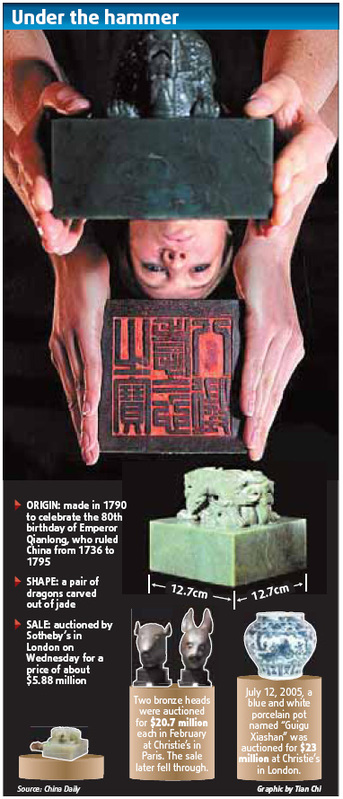
China officials yesterday renewed objection to an auction of looted Chinese relics, following a flood of criticism from netizens over Wednesday's auction of an imperial jade seal in London.
Officials from the State Administration of Cultural Heritage yesterday said the government would spend more manpower and money to collect, clean up and study China's lost relics, and would resort to various measures to get the lost relics back.

An imperial jade seal, owned by the Qing Dynasty Emperor Qianlong, who ruled China from 1736 to 1795, fetched 3.6 million pounds ($5.9 million), six times its top estimate.
A total of 153 pieces of Chinese artwork, including the seal, were sold for more than 8 million pounds by London-based auctioneer Sotheby's on Wednesday.
"Sotheby's is not aware of any issue of legal title or provenance concerning the Imperial Jade Seal in Sotheby's London Fine Chinese Ceramics and Works of Art Sale," said Simon Warren, an official from Sotheby's in London.
Warren revealed there was underbidding on the seal from the Chinese mainland, Taiwan and Hong Kong.
Sotheby's said the seal, from a European private collection, was fought for by eight bidders and was sold to an anonymous dealer in the room, Bloomberg reported yesterday.
Netizens were angry over the news. Online forums are awash with indignant comments.
"We should launch a nationwide protest to urge those robbers to give back our national relics," a netizen said on sina.com.
"The government should chase down our national relics. We cannot let the invaders humiliate Chinese people by selling the relics they looted from our territory," another said.
Some netizens referred to the Christie's case half a year ago, in which Cai Mingchao, a domestic relics collector, claimed he had secured the winning bid of two looted Chinese bronze relics with 14 million euros ($21 million) each but refused to pay for the objects later, calling for the items to be returned to Chinese officials to be kept safely as historical relics.
Experts warned against too much public outcry, noting that some overseas auctioneers are using Chinese people's patriotism to drive up the prices of Chinese relics.
People should first learn how the relics were taken from China to avoid "blind condemnations", said Jin Yunchang, a researcher from the Palace Museum.
If the relics are not stolen objects, they can be legally auctioned.
A large-scale condemnation from the Chinese people will only drive up the hammer price, which is not good for potential Chinese bidders, he said.
According to the Chinese Cultural Relics Association, up to 10 million cultural relics were looted or illegally sold from China between 1840 and 1949.